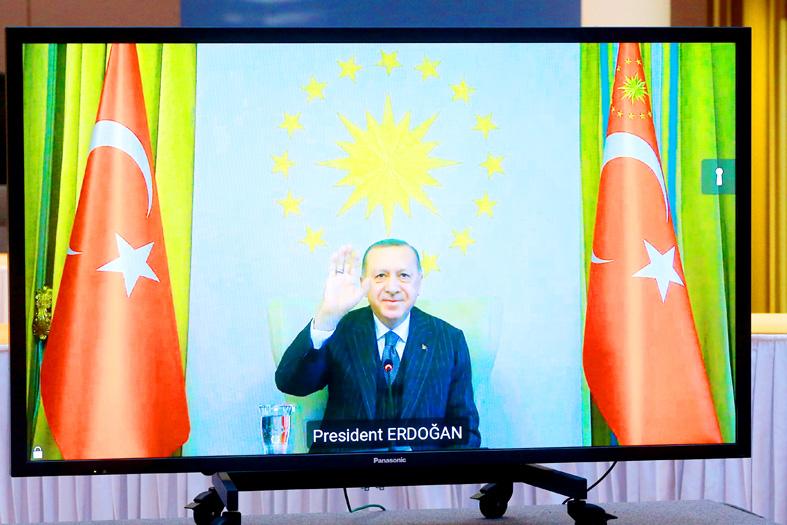Turkish President Recep Tayyip Erdogan pulled the country out of an international accord designed to protect women, the country’s official newspaper said yesterday, despite calls from campaigners who see the pact as key to combating rising domestic violence.
The Istanbul Convention, forged by Council of Europe member states in the Turkish city of Istanbul, pledged to prevent, prosecute and eliminate domestic violence, and promote equality.
Turkey, which signed the accord in 2011, registered a rise in femicides last year.

Photo: Reuters
No reason was provided for the withdrawal, but officials in Erdogan’s ruling Justice and Development Party had last year said that the Turkish government was considering pulling out amid a row over how to curb growing violence against women.
“The guarantee of women’s rights are the current regulations in our bylaws, primarily our constitution. Our judicial system is dynamic and strong enough to implement new regulations as needed,” Turkish Minister of Family, Labor and Social Services Zehra Zumrut said on Twitter, without providing a reason for the move.
Many conservatives in Turkey say that the pact undermines family structures, encouraging violence. They are also hostile to the principle of gender equality in the Istanbul Convention and see it as promoting homosexuality, given its principle of non-discrimination on grounds of sexual orientation.
Critics of the withdrawal from the pact have said that it would put Turkey further out of step with the values of the EU, which it remains a candidate to join.
They argue that the deal, and legislation approved in its wake, need to be implemented more stringently.
Turkey is not the first country to quit the accord.
The Polish supreme court scrutinized the pact after a Polish Cabinet member said that Warsaw should quit the “too liberal” treaty.
Erdogan has condemned violence against women, including this month saying that his government would work to eradicate violence against women.
However, critics say that his government has not done enough to prevent domestic violence.
Turkey does not keep official statistics on femicide, but WHO data showed that 38 percent of women in Turkey are subject to violence from a partner in their lifetime, compared with about 25 percent in Europe.
Ankara has taken measures such as tagging individuals known to resort to violence and creating a smartphone app for women to alert police, which has been downloaded hundreds of thousands of times.
Erdogan’s decision comes after he this month unveiled judicial reforms that he said would improve rights and freedoms, and help meet EU standards.
Turkey has been a candidate to join the bloc since 2005, but access talks have been halted over policy differences and Ankara’s record on human rights.

POLITICAL PRISONERS VS DEPORTEES: Venezuela’s prosecutor’s office slammed the call by El Salvador’s leader, accusing him of crimes against humanity Salvadoran President Nayib Bukele on Sunday proposed carrying out a prisoner swap with Venezuela, suggesting he would exchange Venezuelan deportees from the US his government has kept imprisoned for what he called “political prisoners” in Venezuela. In a post on X, directed at Venezuelan President Nicolas Maduro, Bukele listed off a number of family members of high-level opposition figures in Venezuela, journalists and activists detained during the South American government’s electoral crackdown last year. “The only reason they are imprisoned is for having opposed you and your electoral fraud,” he wrote to Maduro. “However, I want to propose a humanitarian agreement that

ECONOMIC WORRIES: The ruling PAP faces voters amid concerns that the city-state faces the possibility of a recession and job losses amid Washington’s tariffs Singapore yesterday finalized contestants for its general election on Saturday next week, with the ruling People’s Action Party (PAP) fielding 32 new candidates in the biggest refresh of the party that has ruled the city-state since independence in 1965. The move follows a pledge by Singaporean Prime Minister Lawrence Wong (黃循財), who took office last year and assumed the PAP leadership, to “bring in new blood, new ideas and new energy” to steer the country of 6 million people. His latest shake-up beats that of predecessors Lee Hsien Loong (李顯龍) and Goh Chok Tong (吳作棟), who replaced 24 and 11 politicians respectively

Young women standing idly around a park in Tokyo’s west suggest that a giant statue of Godzilla is not the only attraction for a record number of foreign tourists. Their faces lit by the cold glow of their phones, the women lining Okubo Park are evidence that sex tourism has developed as a dark flipside to the bustling Kabukicho nightlife district. Increasing numbers of foreign men are flocking to the area after seeing videos on social media. One of the women said that the area near Kabukicho, where Godzilla rumbles and belches smoke atop a cinema, has become a “real

‘POINT OF NO RETURN’: The Caribbean nation needs increased international funding and support for a multinational force to help police tackle expanding gang violence The top UN official in Haiti on Monday sounded an alarm to the UN Security Council that escalating gang violence is liable to lead the Caribbean nation to “a point of no return.” Special Representative of the UN Secretary-General for Haiti Maria Isabel Salvador said that “Haiti could face total chaos” without increased funding and support for the operation of the Kenya-led multinational force helping Haiti’s police to tackle the gangs’ expanding violence into areas beyond the capital, Port-Au-Prince. Most recently, gangs seized the city of Mirebalais in central Haiti, and during the attack more than 500 prisoners were freed, she said.